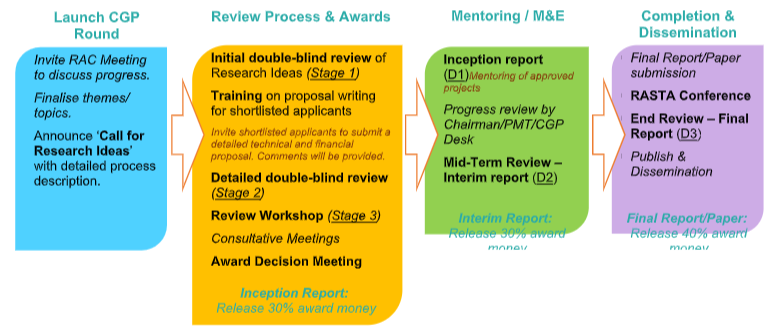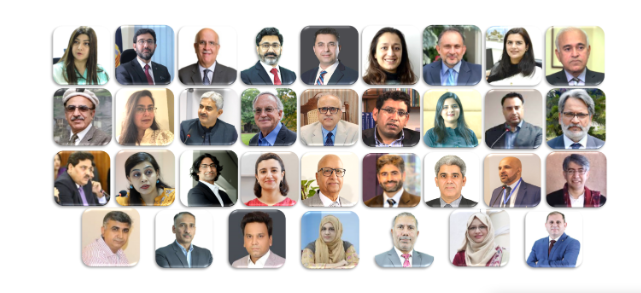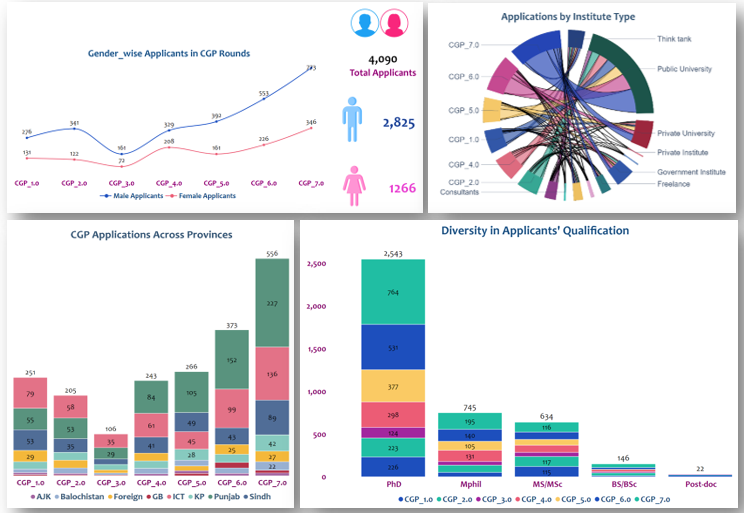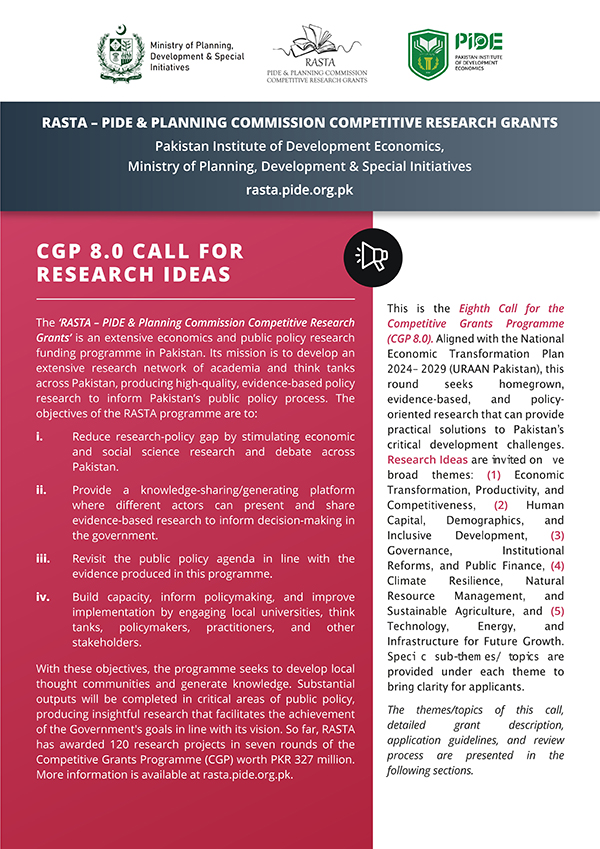CGP 8.0 Call for Research Ideas
The ‘RASTA – PIDE & Planning Commission Competitive Research Grants’ is an extensive economics and public policy research funding programme in Pakistan. Its mission is to develop an extensive research network of academia and think tanks across Pakistan, producing high-quality, evidence-based policy research to inform Pakistan’s public policy process. The objectives of the RASTA programme are to:
- Reduce research-policy gap by stimulating economic and social science research and debate across Pakistan.
- Provide a knowledge-sharing/generating platform where different actors can present and share evidence-based research to inform decision-making in the government.
- Revisit the public policy agenda in line with the evidence produced in this programme
- Build capacity and improve policymaking and implementation by involving and engaging local universities, think tanks, policymakers, practitioners, and other stakeholders.
With these objectives, the programme seeks to develop local thought communities and generate knowledge. Substantial outputs will be completed in critical areas of public policy, producing insightful research that facilitates the achievement of the Government’s goals in line with its vision. So far, RASTA has awarded 120 research projects in seven rounds of the Competitive Grants Programme (CGP) worth PKR 327 million. More information is available at rasta.pide.org.pk.
This is the Eighth Call for the Competitive Grants Programme (CGP 8.0). Aligned with the National Economic Transformation Plan 2024–2029 (URAAN Pakistan), this round seeks homegrown, evidence-based, and policy-oriented research that can provide practical solutions to Pakistan’s critical development challenges. Research Ideas are invited on five broad themes: (1) Economic Transformation, Productivity, and Competitiveness, (2) Human Capital, Demographics, and Inclusive Development, (3) Governance, Institutional Reforms, and Public Finance, (4) Climate Resilience, Natural Resource Management, and Sustainable Agriculture, and (5) Technology, Energy, and Infrastructure for Future Growth. Specific sub-themes/topics are provided under each theme to bring clarity for applicants.
RASTA Competitive Grants Programme (CGP) 8.0 invites research ideas on the following themes/topics:
1. ECONOMIC TRANSFORMATION, PRODUCTIVITY, AND COMPETITIVENESS
(URAAN Themes: Growth Acceleration, Private Sector Development, and Trade Competitiveness)
1.1 Structural Transformation and Growth: Unlocking constraints to sustained GDP growth, sectoral shifts, and productivity enhancement.
1.2 Private Sector-Led Development: Improving the investment climate, fostering entrepreneurship, and accelerating industrial upgrading.
1.3 Trade and Export Competitiveness: Exploring new markets, diversifying exports, leveraging trade agreements, and revitalising SEZs.
1.4 Business Enabling Environment: Reforming regulatory frameworks, reducing compliance burdens, and measuring the informal economy effectively.
2. HUMAN CAPITAL, DEMOGRAPHICS, AND INCLUSIVE DEVELOPMENT
(URAAN Themes: Human Development, Skills, and Inclusive Growth)
2.1 Demographic Trends and Opportunities: Managing population dynamics, harnessing the youth dividend, and addressing urbanisation challenges.
2.2 Equitable Social Service Delivery: Ensuring access, quality, and accountability in education, health, water, and sanitation.
2.3 Skills, Innovation, and Higher Education Reform: Improving governance, aligning curricula with market needs, bridging skill mismatch, strengthening TVET, and promoting R&D ecosystems.
2.4 Inclusive Social Protection Systems: Building adaptive safety nets, reducing poverty and vulnerability, advancing universal health coverage, and improving food and nutrition security.
3. GOVERNANCE, INSTITUTIONAL REFORMS, AND PUBLIC FINANCE
(URAAN Themes: Institutional Strengthening, Fiscal Transformation, and Rule of Law)
3.1 Fiscal Sustainability and Reform: Tax base expansion, subsidy rationalisation, debt management, and public expenditure efficiency.
3.2 Local Governance and Decentralisation: Empowering local governments for effective service delivery and fiscal autonomy.
3.3 Institutional Modernisation and Rule of Law: Reforming civil service, judicial systems, anti-corruption mechanisms, and governance in fragile contexts.
3.4 Regulatory and Policy Coherence: Streamlining institutional overlap and ensuring policy predictability for economic actors.
4. CLIMATE RESILIENCE, NATURAL RESOURCE MANAGEMENT, AND SUSTAINABLE AGRICULTURE
(URAAN Themes: Green Growth, Water Security, and Climate Adaptation)
4.1 Water and Agriculture Innovation: Strengthening water governance, promoting climate-smart agriculture, and deploying agri-tech for food security.
4.2 Climate Risk Management and Resilience: Improving disaster risk reduction, post-disaster recovery, and responses to glacial lake outburst floods (GLOFs).
4.3 Just Climate Transition: Addressing equity in climate adaptation, protecting vulnerable populations, and managing climate-induced migration.
4.4 Environmental Sustainability and Circular Economy: Promoting biodiversity, reducing pollution, enhancing waste-to-energy models, and conserving natural resources.
5. TECHNOLOGY, ENERGY, AND INFRASTRUCTURE FOR FUTURE GROWTH
(URAAN Themes: Energy Security, Technological Transformation, and Infrastructure Modernisation)
5.1 Energy Security and Transition: Advancing renewable energy adoption, resolving circular debt, and decentralising power systems.
5.2 Technological Leapfrogging and Digital Governance: Leveraging AI, fintech, and big data to drive productivity, service delivery, and digital governance.
5.3 Digital Inclusion and Social Equity: Bridging the digital divide, addressing gender disparities in digital access, and supporting digital skills development.
5.4 Smart Infrastructure and Sustainable Urbanisation: Developing green, resilient cities, upgrading logistics, and mobilising finance for infrastructure innovation
SUBMISSION DEADLINE: RASTA CGP 8.0 invites research ideas on the above-listed research topics. Proposed studies must identify key policy issues and public policy decisions in Pakistan, assess the empirical outcomes of those decisions, evaluate constraints to policy reform, and examine alternative policy recommendations to enhance their impact. The Research Idea (stage 1) submission is due by September 20, 2025, midnight PST.
RASTA PROGRESS HIGHLIGHTS

CGP GRANT DESCRIPTION
This is the RASTA Competitive Grants Programme’s (CGP) eighth call for research ideas. Submissions will be thoroughly reviewed, and the progress of awarded studies will be closely monitored by the ‘Research Advisory Committee’ (RAC) of RASTA. The following are the broad principles of the programme:
- The maximum duration to complete a project will be 12 months. Shorter duration studies are encouraged.
- The maximum grant available for a project is PKR 6.0 million; PKR 4.2 million for desk research.
- Ideas/proposals will be evaluated by the choice of the problem and expected knowledge outcomes for countrywide or local development.
- Research ideas will be thoroughly reviewed (stage 1 review) and discussed by the members of the RAC before inviting shortlisted applicants to attend a training course.
- The successful applicants shall be invited for 2-3 days of online training, followed by instructions to submit the detailed research proposal.
- Detailed research (technical) proposals will be thoroughly reviewed (stage 2 review) and discussed by the members of the RAC before inviting the shortlisted applicants to the CGP 8.0 Review Workshop (stage 3 review).
- This will be followed by the Award Decision Meeting of the RAC and announcement of awards.
- Reviewers’ comments on the research proposals (stage 2) will be shared with all shortlisted applicants regardless of the outcome. However, there will be no comments on the research ideas (stage 1).
- Mentor(s) will be assigned to provide technical assistance on each award study, and the M&E Desk at RASTA will facilitate the research process.
- All data collected and work produced under RASTA will have to be submitted for authenticity checks.
- Multiple conferences/workshops/webinars will be organised, allowing all reviewers, award winners and sector specialists to see progress and develop network learning.
- Evaluation of government initiatives, policies and processes, and assessment of institutions and their performance in broader socio-economic and development contexts are encouraged.
- Female applicants, university students and researchers from less developed areas of Pakistan are encouraged to participate in the RASTA programme.
- An applicant can submit two research proposals; one research proposal as PI and one research proposal as Co-PI; or can be a part of teams as Co-PI in two research proposals.
APPLICANTS’ QUALIFICATIONS: Research ideas are solicited from qualified individuals (and/or groups of individuals) interested in Pakistan’s economic development and public policy issues, including faculty members and staff at international and local universities, as well as research institutes within and outside Pakistan. Freelancers, policy specialists and/or practitioners may also submit research ideas to win the CGP Awards. Research ideas are encouraged from Pakistani graduate students enrolled in PhD and thesis-based MS/MPhil degree programmes at Pakistani and foreign universities, as well as from faculty members, to support the research of these students.
INCLUSION POLICY: In light of the RASTA objectives, three Tiers have been defined to give equal opportunities to applicants from less developed areas. Tier 1 includes applicants/institutes in Islamabad, Lahore, Karachi and all foreign institutes; Tier 2 includes applicants/institutes in the Punjab (except Lahore), Sindh (except Karachi) and Khyber Pakhtunkhwa (except Ex-FATA); while Tier 3 includes applicants/institutes in Balochistan, Ex-FATA, Gilgit-Baltistan, and Azad Jammu & Kashmir. Research ideas from each of the three tiers will be evaluated in separate competitive categories. Outstanding research ideas from each category are anticipated to be funded. Research ideas may be submitted by individual applicants or by teams of up to four investigators. Collaborative proposals from teams based at multiple institutions and/or involving practitioners from relevant policy sector organisations are encouraged.
CGP APPLICATION GUIDELINES
ELEMENTS OF THE GRANT APPLICATION: English is the language to be used in the RASTA Competitive Grants Programme. However, applicants may articulate their research argument/problem in Urdu if someone finds it difficult to express it in English. All CGP applications must include the following:
- RASTA Form A-1 (Cover Sheet)
- RASTA Form A-2.1 (Research Idea – Stage 1)
- RASTA Form A-2.2 (Research Proposal – Stage 2)
- RASTA Form A-3 (Financial Proposal – Stage 2)
- Additional Documents:
- For professional applicants: A brief curriculum vitae (1-3 pages) for Principal Investigator/Co-PI.
- For university student applicants: (i) Official transcript of graduate coursework completed and a list of planned additional course enrolment, and (ii) A letter of recommendation from the applicant’s research supervisor.
SUBMISSION PROCESS AND DEADLINE: For Stage 1, download the RASTA Application Forms (A-1 and A-2.1) from the RASTA website. Complete forms (in MS Word format) must be submitted electronically to rasta@pide.org.pk before the deadline. For Stage 2, shortlisted applicants will be invited to submit full technical and financial proposals; download the RASTA Application Forms (A-1, A-2.2, and A-3) from the RASTA website. Applications will be acknowledged by return email within 15 days after the submission deadline.
- Do NOT mention your name and/or organisation anywhere except in Form A-1 (Cover Sheet). The application will not be processed if there is non-compliance. There is no need to submit a hard copy of the application.
- The deadline for application submission is September 20, 2025 by midnight, Pakistan Standard Time (PKT). Incomplete applications and applications received after the deadline will not be considered.
BUDGET GUIDELINES: The maximum grant available for a project is 6.0 million. Remuneration of maximum Rs. 180,000 per month for a member of the research team; a maximum of 70% of the total announced grant, i.e., Rs. 4.2 million can be availed under RASTA CGP. A research team can be comprised of a maximum of four members, including the PI. The Co-PIs may not be paid more than the PI. Income tax on remuneration will be deducted at source. For field visits/ data collection, TADA/accommodation costs can be included as per the Federal Govt rules. A maximum of 03% contingency and 10% institutional overhead of the calculated budget are permissible, to be included within the upper limit of the grant.
DISBURSEMENT OF FUNDS: The disbursement of award money will occur in three tranches linked to the deliverables:
- 30% upon selection of the proposal for an award and submission/clearance of the Inception Report
- 30% upon satisfactory acceptance by the review panel of an Interim Report & presentation at the Mid-Term Review Workshop; and finally,
- 40% upon satisfactory acceptance by the review panel of the project’s final Research Paper & presentation at the RASTA-PIDE Conference.
- NOTE: There is No provision for any hardware/software purchases, including data, books, laptops, software, equipment etc. The publishing, printing, and dissemination of the study are the responsibility of RASTA. All CGP Awardees (RASTA Fellows) shall provide duly verified receipts of all expenses. If there is any unspent balance, it will be adjusted in the 3rd instalment. Detailed accounting procedures of RASTA will be shared afterwards.
CGP PROCESS
SELECTION CRITERIA AND PROCESS: All complete grant applications will be reviewed by a scholarly review panel comprised of members of the Research Advisory Committee (RAC) and RASTA Review Panel. Research ideas/proposals will be evaluated based on (a) the importance of the topic and relevance to the given research themes/sub-themes/topics; (b) the cohesion and creativity of the proposed research; (c) the research design and technical feasibility of the proposed research approach and analysis; (d) value of expected research outcomes for public policy; and (e) qualifications of the principal and co-principal investigator(s) for undertaking the proposed study. Only top-ranked proposals will be invited to present orally (in person or online) at the RASTA Review Workshop. The complete CGP process is illustrated below:


RASTA AWARDS & DASHBOARD
Since October 2020, RASTA has successfully established a vast network of researchers, academia, and practitioners. Today, this network comprises 270+ universities and think tanks, 17 international institutes, 27 Government organisations, and over 4,300 researchers, academicians, practitioners, and professionals. So far, RASTA has launched seven CGP rounds since its inception, during which approximately 4,090 researchers submitted 1,664 applications. A total of 120 CGP grants were awarded, worth PKR 327 million. To date, 90 CGP projects have been completed

EXPECTED OUTPUTS & RESEARCH DISSEMINATION
RASTA Fellows are expected to present their papers at the RASTA Conference and other national and/or international conferences/research events. There will be two types of publications: (a) RASTA-PIDE Conference Papers, and (b) RASTA Local Research, Local Solutions Volumes. All Fellows will be asked to produce one or two RASTA Policy Briefs for wider research dissemination. The RASTA programme will organise multiple research conferences/workshops. RASTA Fellows are expected to make two presentations of their work: (i) an Interim research report at the Mid-Term Review Workshop, and (ii) a presentation corresponding to their research paper at the RASTA Conference. Members of the RAC and other invitees from the public and private sectors will participate in these events.
RASTA RESEARCH ADVISORY COMMITTEE (RAC)
The RASTA is guided by a scholarly RAC, chaired by Dr Muhammad Nadeem Javaid (SI), Vice Chancellor, PIDE Islamabad. The members of the RAC are well-reputed national and international researchers, academics, practitioners, and international scholars of economic development, as well as senior officials from federal and provincial governments. The role of RAC is critical from the call for applications to the final submission of the research paper. Each member of RAC critically reviews research proposals, participates in the decision to award funds, monitors progress, and mentors some of the awarded research studies during the course.
RASTA PROJECT MANAGEMENT TEAM
The Project Management Team (PMT) is the operational arm of the RASTA programme at PIDE, Islamabad. The PMT manages all programme activities under the leadership of Dr Muhammad Nadeem Javaid (SI), Chairman RAC / Vice Chancellor, PIDE Islamabad and Dr Faheem Jehangir Khan, Project Director, RASTA / Dean (Policy), PIDE Islamabad. The PMT, stationed at an independent Project Management Unit, is responsible for administering the grant selection procedure established by the scholarly Research Advisory Committee (RAC), disbursing funds based on the fulfilment of grant requirements by recipients, and other operational aspects of the programme.
EVENTS & KNOWLEDGE HUB
Visit RASTA Knowledge Hub to find out more about RASTA events, research videos, RASTA publications, and policy briefs. According to the RASTA Open Access policy, all research materials are freely available online. For more updates about the RASTA events and opportunities, follow us on our social media platforms.

